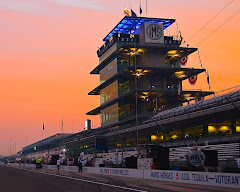Perhaps, like me, you are more than a little surprised by the difficulty of the task.
Entertainment
Several posters have suggested that "entertainment" is one of the primary jobs that IndyCar consumers are trying to get done. I tend to agree.
However, channeling my inner Socrates, I then ask myself: What is entertainment? Is entertainment really a job? Would we not be more accurate if we were to determine that entertainment is a category that encompasses many different and highly variable jobs that consumers are trying to get done?
The following definitions are from Dictionary.com.
Entertainment - 1. the act of entertaining; agreeable occupation of the mind; diversion; amusement. 2. something affording pleasure, diversion, or amusement, especially a performance of some kind.
I did not find these definitions to be particularly helpful. Once again, we are dealing with proximate categories, namely diversion, amusement, and pleasure. Our task requires more granularity.
The Law recognizes the differences between proximate causes and direct causes. We should do so, as well.
First, we must identify core "jobs" that enable us to be diverted, amused and pleased. Then, we can determine which of those "jobs" IndyCar might enable its customers to accomplish.
Daredevil Drivers & Harrowing Escapes
For example, prewar Indy competitors were promoted as "Daredevil Drivers." The notion of overcoming perceived physical limitations and danger was a strong driver of "entertainment" at that time
Frank Lockhart, the 1926 Indianapolis 500 winner, is considered by many to have been the dominant U.S. racing driver of his era. The preeminent escape artist of the same era was Harry Houdini. Might these two heroes of the Roaring 20s have been popular for similar reasons? I will argue that, indeed, they were.
Both were confessed mere mortals who appeared to have mastered the complex machines of their time. Neither Lockhart nor Houdini claimed to possess any mystical power to manipulate nature. They amazed and astonished consumers because they were ordinary men appeared to cheat death as a matter of course.
The Jobs
It is clear that both Frank Lockhart and Harry Houdini successfully "entertained" their customers. The relevant question, then, is: What were the "jobs" that Lockhart and Houdini enabled consumers to accomplish?
I believe that the answers to this question are very important. The Spectator Sports Industry was in its nascent stages in the 1920s and 30s. Houdini was a throwback, a legacy act that was derived from traveling circuses, minstrel shows and religious revivalism.
Conversely, racing, boxing and baseball were just beginning to replace those types of acts as staples of the spectator-supported events industry. AM radio, the disruptive mass communications technology of the era, unleashed abundant pent-up demand for entertainment that was based on athletic and sporting competition. In 1939, the NCAA, heretofore a small rule-making committee for intercollegiate athletics, entered the event promotion business with its inaugural men's basketball National Championship.
Level of Analysis
This is the type of analysis that I believe we must produce. We must ask "what" and "why" - the two interrogative forms that can not be answered with a yes or a no. The challenge is daunting.
And, so, we begin.
What do we mean when we say that IndyCar must "entertain" its customers?
I look forward to reading your answers.
Roggespierre




Thanks for the...uh....recognition.
ReplyDeleteMarlboro is way off base too, thinking that promotion/ freebies will get people in the door and expose them to a product they might like. What a foolish idea.
Sports is improv.
Andrew Bernstein
Hi "R."
ReplyDeleteI agree. "Entertainment" is a broad label and subjective. What are it's elements? This is what I believe you are asking. Here are some thoughts:
*Personalities, people you can love, hate or just be intrigued by.
*Drivers you can relate to. Drivers that fans can live their fantasies through, live vicariously. This is where a focus on American drivers is as essential here as having an American team in the Olympics.
*Innovation, especially innovation relevant to our lives. Diverse approaches to building race cars. (Back to leadership in 21st century auto solutions)
*A sense of history. This is an important measuring stick to see how today's competitors: drivers, owners, mechanics, stack up against those that preceded them. This bridges generations, mature fans with young ones.
The common thread across all these is that they contribute to a sense of community. They give people something to talk about - like on this forum. This is a huge part of entertainment, and meshes wonderfully with our network world of handheld apps, Websites, discussion forums and the like.
Tom Cooper
Entertainment
ReplyDeleteI may have a different take on “entertainment .
To be entertained I would go to a funny movie, or a stage performance, or go to listen to a comic.
I go to a race to see a contest, not necessarily to be entertained. The contest I go to see is between drivers, cars, and the elements which includes the venue, weather, and the race as it develops.
Oh, in retrospect it can be entertaining--but it can be anything but entertaining.
A race may or may not be entertaining. But it needs to provide in advance the distinct possibility that it will be entertaining, or at least memorable.
The Indianapolis 500 is more than a race, it is a “happening” which builds a degree of anticipation of having a race that will be memorable and perhaps entertaining.
Some of the most memorable “500” were anything but entertaining, but they were remembered for the events that transpired. A couple of examples: 1958, the year Eddy Elisian and Dick Rathmann battled all month to see who would be on the pole and to lead the first lap--neither did-- they crashed on the first lap and the wreck killed Pat O’Connor--memorable, YES. Entertaining? Hardly . The 1973 race won by Gordon Johncock in three days of rain, rain, rain, entertaining? NO, but surely memorable.
I think any competitive event can be entertaining and depressing at the same time. An example, if you are a Florida Football Gator fan the National Championship Game in which they beat The Ohio State Buckeyes 41-14 was entertaining, but to OSU fans it was perhaps memorable, but surely not entertaining.
In racing the goal should be to make the venue memorable and possibly entertaining (which is a result), in order to do that it has to produce racing that has the following: fans who anticipate a competitive event, drivers who have followers, cars that draw attention, and ancillary events, prepared by professional people at a facility that offers a competitive event.
So I want a MEMORABLE EVENT--NOT NECESSARILY AN ENTERTAINING ONE.
osca
Suspense, or the emotional experience associated with uncertainty of future outcomes, seems to be the driver or key element underlying one's attraction to sports. And the level of suspense one experiences is directly tied to the disposition one holds towards the various competitors. So the more we admire the hero or detest the villain; the greater our emotional experience as the race (storyline/drama) unfolds.
ReplyDeleteAs to the jobs, I'd say, providing characters that an emotional affiliation can be developed, in a backdrop where a dramatic or suspenseful storyline can unfold. In a similar manner, the innovation angle if properly managed, could bring an additional element of suspense.
-John
To all the respondents thus far, I see us narrowing in on what the job is. Tom I like your take on "the sense of history" and the feeling of community. For many of us, both new and old fans, the Indianapolis Motor Speedway is "the most hallowed ground in auto racing". Attending the 500 or watching should provide us with a link to that sense of history and a shared sense of community. If we are remiss in acknowledging that in our vision and mission statements we do so at great peril.
ReplyDeleteJohn and osca you have hit on the what may be the core job of the 500 and the series. The races/racers and venues must provide compelling stories and must be memorable. I think we should drop the word entertaining from the mission statement. We want events that will leave people talking about it over the watercooler (in glowing terms) in the days afer the event. "Entertainment" is what NASCAR purports to provide.
For example, prewar Indy competitors were promoted as "Daredevil Drivers."
ReplyDeleteWe need to use promotion to create anticipation of a memorable event.
I think we're getting closer.
ReplyDeleteStill, "compelling" and "memorable" are adjectives. We need actions, "jobs" that customers want to get done. Because those "jobs" are discretionary, they must necessarily be compelling and memorable.
What are those jobs?
I shall provide some possibilities in at the top.
Best Regards,
Roggespierre